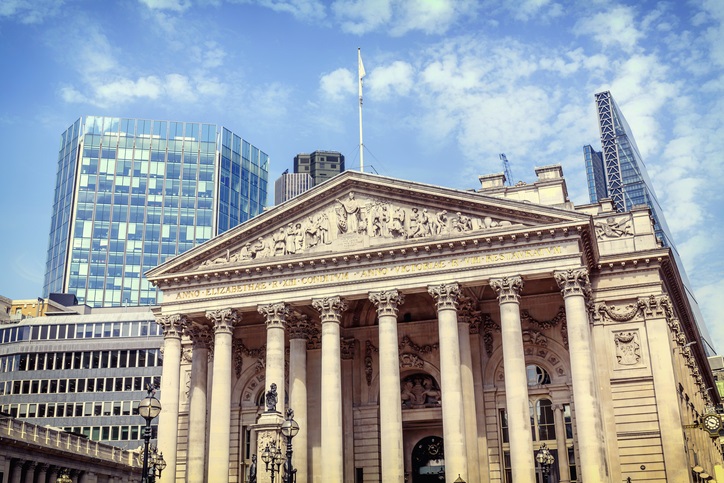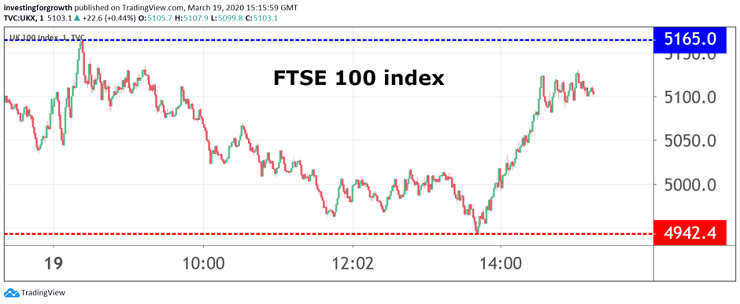Bank of England cuts rates to record low: How the market reacted
After further losses were suffered by stock markets in early trade, policymakers have stepped in again.
19th March 2020 15:13
by Graeme Evans from interactive investor
After further losses were suffered by stock markets in early trade, policymakers have stepped in again.

It was another torrid morning for the FTSE 100 and other European stock markets, until Wall Street opened and bounced sharply from early losses. Market players are also assessing another emergency cut in interest rates by the Bank of England.
Trading at around 4,960 at 13:45 on Thursday, the FTSE 100 took an hour to add 160 points and move into positive territory for the day.
The UK Bank rate now stands at just 0.1%, a record low, and down from 0.25% previously, following a special meeting of the Monetary Policy Committee today. The Bank is also increasing its holdings of UK government and corporate bonds by £200 billion.

Source: TradingView Past performance is not a guide to future performance
A market rally had already helped claw back losses felt by the aerospace industry. A hugely uncertain outlook had earlier sent a shudder through Rolls-Royce (LSE:RR.), Melrose Industries (LSE:MRO) and Meggitt (LSE:MGGT) shares.
The slide in the top-flight index to below 5,000 came with the City and the rest of London on the brink of a possible lockdown in order to curb the spread of coronavirus. The economic impact of such a move was particularly felt in the UK-focused FTSE 250 index, which fell 4% at one stage to 12,474.
It seemed that few investors believe that recent emergency action taken by policymakers will be sufficient to prevent a global recession. There was also no assistance from the current 35-year low for the pound, with such weakness usually helpful for the top-flight due to the high volume of overseas-focused companies.
Some familiar stocks were back at the top of the FTSE 100 fallers board, with declines of 12% for easyJet (LSE:EZJ) and InterContinental Hotels Group (LSE:IHG) amid the recent halt to global travel.
The repercussions for the global airline industry are likely to last for many years, prompting US investment bank JP Morgan to cut its price target on civil aerospace engine maker Rolls by 29%. The company, which last updated the market at its annual results in February, has now lost more than 50% of its value since the sell-off began a month ago.
GKN owner Melrose fell another 12% to widen losses since mid-February to 59%. Meggitt, which provides high performance components for the aerospace, defence and energy markets, said today it was too early in the crisis to provide earnings guidance for the rest of the year.
It is currently leading a consortium of UK aerospace suppliers working to meet the UK's needs for large numbers of additional medical ventilators. Senior, which operates in similar markets to Meggitt, lost almost a third of its value in the FTSE All-Share today.
Other significant blue-chip fallers included Burberry (LSE:BRBY) after the luxury goods group said retail store sales were between 40% and 50% lower over the last six weeks.
More than 60% of stores in Europe and the Middle East and 85% in the Americas are currently closed, with those still open operating with reduced hours and very weak footfall.
Despite the resumption of trading in most outlets in mainland China, Burberry expects retail store sales in the final weeks of the financial year will be down between 70% and 80%. It said it would look to contain costs and renegotiate rents, while also benefiting from “significant financial headroom” including liquidity of £900 million.
Stocks from traditionally high-yielding sectors, such as housebuilding and insurance, were under pressure in the top -light amid fears about the security of their dividends. Taylor Wimpey (LSE:TW.) and Barratt Developments (LSE:BDEV) were down 11% and 8% respectively, with Aviva (LSE:AV.) off 11% and Legal & General (LSE:LGEN) 10% down.
Among blue-chip stocks displaying resilience, Vodafone (LSE:VOD) is up over the course of the week after rising another 4% today. The mobile phone giant revealed yesterday that it was seeing a 50% spike in data traffic in some of its markets due to the Covid-19 outbreak.
Supermarkets are also seeing a surge in demand, pushing shares in Sainsbury (LSE:SBRY), Tesco (LSE:TSCO) and Morrisons (LSE:MRW) higher over the week. In addition, they stand to benefit from the UK government's £350 billion emergency aid package, which includes a business rates holiday for the rest of the financial year.
Stockopedia's Ben Hobson this week named the trio in a list of 10 defensive high-yielding blue-chip shares for investors to consider. The screen also includes British American Tobacco (LSE:BATS), SSE (LSE:SSE), GlaxoSmithKline (LSE:GSK), Tate & Lyle (LSE:TATE), National Grid (LSE:NG.), United Utilities (LSE:UU.) and Severn Trent (LSE:SVT).
- 10 defensive high-yield FTSE 100 shares
- Coronavirus crisis: An essential guide for all investors
- The single most important concept for every investor
Elsewhere in the retail sector, Next shares were higher as it expressed confidence it will weather the storm despite a potential £1 billion hit to sales from Covid-19. Marks & Spencer (LSE:MKS) has also consolidated the gains seen on Wednesday and Thursday, while McColl's Retail Group (LSE:MCLS) added another 24% and Hollywood Bowl (LSE:BOWL) rose 11%.
These articles are provided for information purposes only. Occasionally, an opinion about whether to buy or sell a specific investment may be provided by third parties. The content is not intended to be a personal recommendation to buy or sell any financial instrument or product, or to adopt any investment strategy as it is not provided based on an assessment of your investing knowledge and experience, your financial situation or your investment objectives. The value of your investments, and the income derived from them, may go down as well as up. You may not get back all the money that you invest. The investments referred to in this article may not be suitable for all investors, and if in doubt, an investor should seek advice from a qualified investment adviser.
Full performance can be found on the company or index summary page on the interactive investor website. Simply click on the company's or index name highlighted in the article.